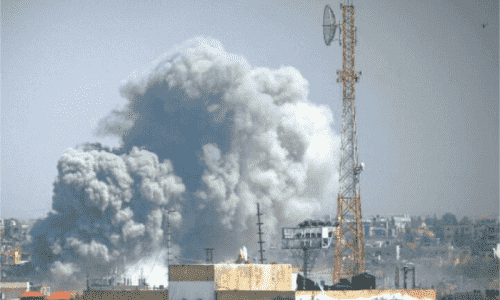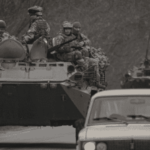RAFAH: Israel sent tanks into Rafah in southern Gaza, seizing control of the border crossing with Egypt on Tuesday, an operation the UN said denied it access to the key humanitarian passage.
The military’s advance into the civilian-heavy eastern sector of the city coincided with the arrival in Cairo of mediators and negotiators in an attempt to reach a ceasefire and prisoner release in the wake of the Israeli offensive, which has been ongoing for seven months.
Requesting anonymity to discuss the negotiations, a senior Hamas official issued a warning, stating that Israel would be facing its “last chance” to release the estimated 128 captives currently detained in Palestinian land, of which 35 are believed to be dead by the IDF.
According to the official, a Hamas delegation was traveling “shortly” to Cairo. Israel declared that it would send negotiators as well, and Qatar, the mediator, declared that it was sending a delegation as well.
After Hamas said late on Monday that it had accepted a truce deal, the long-threatened Rafah operation got underway, amid the cheers of onlookers who took to the streets even though Israel claimed it was “far” from the plans it had previously agreed to. According to army footage, Israeli flag-flying tanks were observing the Palestinian side of the Rafah border and assuming “operational control.” The military described this type of deployment as having a “very limited scope against very specific targets.”
In the event that truce negotiations fail to win the release of detainees detained there by Hamas forces, Israeli Defense Minister Yoav Gallant declared on Tuesday that Israel was ready to “deepen” its operation in Gaza.
The official Palestinian news agency WAFA said on Tuesday that the Palestinian Authority had earlier demanded that the US “intervene immediately” to stop Israel from occupying Rafah.
With only “one day of fuel available” within the beleaguered enclave, UN humanitarian office spokesman Jens Laerke claimed that Israel has refused it access to both Rafah and Kerem Shalom, the other major aid crossing in Gaza, on the border with Israel.
Secretary-General Antonio Guterres called on Israel to “immediately” reopen the crossings and to “stop any escalation” at the UN. “A full-scale assault on Rafah will be a human catastrophe,” Mr. Guterres warned, adding that “the closure of both… crossings is especially damaging to an already dire humanitarian situation.”
“Stay-long cease-fire”
On Monday, Hamas announced that it has informed officials in Egypt and Qatar that it “approves of their proposal regarding a ceasefire.”
The proposal was “far from Israel’s essential demands,” according to the office of Israeli Prime Minister Benjamin Netanyahu, but the government will nonetheless send diplomats for discussions.
Meanwhile, it stated, Israel is carrying out the Rafah operation to put military pressure on Hamas to expedite the release of prisoners.
Shut up The US, an ally of Israel, declared that it was “reviewing” Hamas’s answer.
According to Hamas member Khalil al-Hayya, the proposal that Hamas accepted contained a three-phase truce, as reported by the Qatar-based news station Al Jazeera. With the aim of a “permanent ceasefire,” he claimed, it included a full Israeli withdrawal from Gaza, the repatriation of Palestinians who had been displaced by the conflict, and a prisoner exchange.
worldwide alarm
Concern about the ramifications of an Israeli ground invasion on Rafah, where the UN estimates 1.4 million Palestinians are seeking sanctuary, has grown on a global scale.
Josep Borrell, the head of EU foreign policy, voiced alarm that an attack on Rafah started in spite of US and EU warnings. “I fear that this will result in numerous civilian casualties once more,” he expressed his fear.
Egypt called upon Israel to “restrain to the greatest extent possible,” and the Organization for Islamic Cooperation (OIC) denounced Israel’s “violent hostility.”
US President Joe Biden reiterated “his clear position” against an invasion of Rafah during a conversation with Netanyahu on Monday, according to the White House.
“Protection” for Rafah’s civilian population was advocated by German Foreign Minister Annalena Baerbock. She claimed in a post on X that “a million people cannot simply vanish into thin air” and urged “more humanitarian aid urgently.”
Doctors Without Borders (MSF), a medical charity, announced that it had started releasing patients from a field hospital in Rafah and was getting ready “for a possible evacuation.”
According to Turkish Vice President Cevdet Yilmaz, Israel has committed yet another war crime with the operation in Rafah. “Israel has added another war crime to the many it has committed in Palestinian territories since October 7 by launching a ground attack on Rafah, just one day after Hamas accepted Qatar and Egypt’s proposal for a ceasefire deal,” Mr. Yilmaz stated on X.








